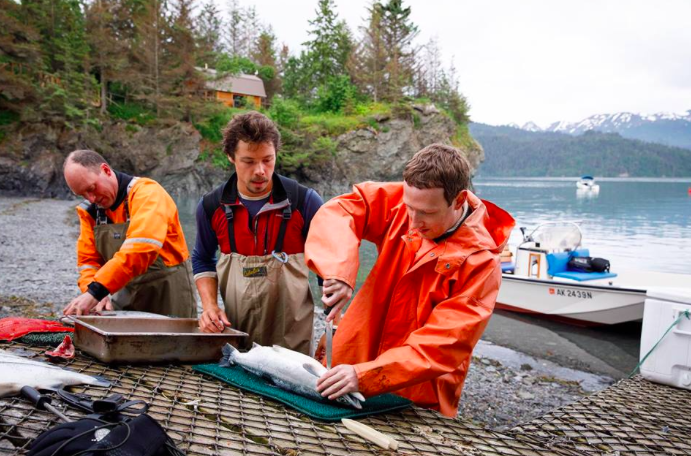
Mark Zuckerberg is out to see America. The founder and CEO of Facebook is diving into the weird and wonderous aspects that make the country tick. He’s writing about it on … Facebook. America is following him on the social media platform and learning from him.
This week Zuck was in Williston, North Dakota, learning everything about the oil boom that was created by technology — fracking. He’s talked to the people who work in the oil industry. He encouraged the readers of his page to learn about things that make them uncomfortable, like fracking and oil. His posts are open and engaging — dare we say rational about climate change and the need for energy.
Earlier this month, he kayaked in Kachemak Bay while staying at a wilderness lodge off the road system. He was spotted dining in Homer and he was found in Seward for the Fourth of July and Mount Marathon race. He observed dip netting for salmon.
It was a form of parachute journaling — but it wasn’t journalism, nor did it pretend to be. He barely dipped his toe in the 49th State, but at least he showed up. He touched a small part of the state, did not aggrandize himself or overstate his understanding in the process, and came away with a more original view of Alaska than the scripted “climate change” tour of former President Barack Obama.
Must Read Alaska could not contain itself and commented on Zuckerberg’s views on the Permanent Fund dividend as an example of “basic income,” a topic he has been exploring:
[Read: Zuckerberg promo for Alaska sends wrong message]
WHY NEWSPAPERS FEAR FACEBOOK
Zuckerberg is someone who attracts attacks from legacy news companies because Facebook is a platform for chronicling many things that newspapers used to cover: Family outings, reunions, births, deaths, war and pussy-hatted marchers.
Newspaper owners famously do not like Facebook because it can purvey a lot of bad information quickly — “fake news.” Newspapers know a fair bit about “fake news.”
But Facebook also allows good information to move more easily. For example, Mat-Su Valley News is a vibrant Facebook page of interest to people in and around Southcentral Alaska. The group has over 22,000 members, just shy of the number who follow the Glenn Highway Traffic Report page.
JBER Man Cave is a group devoted to buying and selling around the military community in Anchorage-Mat-Su, and it’s now 8,800 members strong.
The Juneau Community Collective page has an 8,000-strong following, and in Homer you can catch the drift of things on Homer Communications, where today you can learn the road work on East End Road will resume Monday. Good to know.
Critics from the left said that the fake news passed along on Facebook influenced the election of Donald Trump. Zuckerberg disputes that, calling it a “pretty crazy idea,” and he defends the infinitely diverse points of view that Facebook allows.
In November, the Columbia Journalism Review published an article that posited Facebook is the most powerful publisher in the world and described Zuckerberg as offering a “familiar but increasingly unconvincing narrative that Facebook is not a media company, but a tech company. Given the shock of Trump’s victory and the universal finger-pointing at Facebook as a key player in the election, it is clear that Zuckerberg is rapidly losing that argument.”
In fact, the journalism review’s argument that Facebook’s “fake news” swayed the election toward Trump is the epitome of fake news. It reveals a deep-seated lack of respect for the public’s intelligence and wisdom. Columbia Journalism Review is rife with arrogance about the role of legacy news organizations; everything else to them is fake.
Newspapers are worried in the same way that taxi cartels were worried when transportation network companies came into the marketplace. Uber and Lyft were disruptors and were, in fact, going to take some of the cab companies’ businesses. But in the long run, these independent operators may herald a new era where fewer people need cars, and parking lots and roads are less congested.
Alice Rogoff, publisher of the Alaska Dispatch News, read the Columbia Journalism Review article too, and it moved her to chime with her own social media item — on Twitter, where she perpetuated the fake news item that Facebook was responsible for Trump winning:

And yet Facebook has allowed news sources like Must Read Alaska to reach tens of thousands of people and provide much needed alternatives to the mainstream media. Last month, Must Read Alaska was read by more than 104,000 people, and our traffic originating from Facebook posts was no small part of that readership.
THE ZUCKERBERG ROAD TRIP
But back to the tour.
The 30-state America tour is the smartest thing that Zuckerberg could have done for himself this year. It will be a time of immense personal and political growth, and for a guy who provides a platform that has put the newspaper industry on its heels, it’s also a political move. Perhaps.
